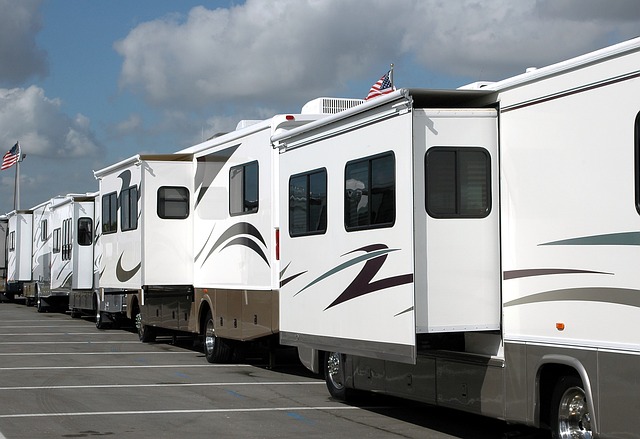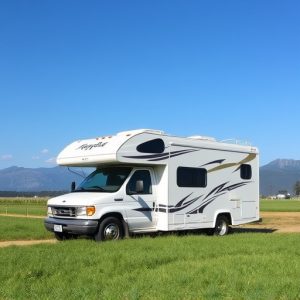Mastering RV Weight Limits: A Guide for Safer Towing and Travel
When planning an RV trip, it's crucial to familiarize yourself with key weight specifications …….

When planning an RV trip, it's crucial to familiarize yourself with key weight specifications for safe travel. These include the Unladen Vehicle Weight (UW), Gross Vehicle Weight Rating (GVWR), Gross Combination Weight (GCW), and Gross Vehicle Weight (GVW). The UW is the RV's base weight, the GVWR is the maximum safe operating weight including the RV, passengers, cargo, and fixed items, and the GCW combines the weights of both the RV and tow vehicle. The GVW specifically accounts for all onboard weights such as people, luggage, and gear. Understanding these metrics, as outlined in your owner's manual, is vital to prevent overloading, which can lead to accidents and invalidate warranties. Adhering to these limits, along with professional hitch weight measurements, follows RV Travel Tips that emphasize safety and comfort. Knowing the Gross Axle Weight Rating (GAWR) ensures even tire wear and vehicle stability. Regular maintenance checks on tires and hitch are essential to maintain a balanced weight distribution within the established ratings, enhancing your travel experience while ensuring road safety.
Embarking on an RV journey offers unparalleled freedom and adventure, yet it demands careful attention to weight limits for safe towing. Understanding the intricacies of Gross Vehicle Weight Ratings (GVWR), Gross Combination Weight Ratings (GCWR), and Gross Axle Weight Ratings (GAWR) is crucial for navigating the open road confidently. This article delves into the essentials of RV weight management, providing clear guidelines on calculating load limits, optimizing payload balance, and ensuring your rig remains both functional and safe. With expert tips on cargo categorization, tire pressure, packing strategies, and maintenance checks, you’ll be equipped to maximize your RV’s capacity while minimizing risks. RV Travel Tips is your go-to resource for mastering the art of RV weight handling, guaranteeing a smooth and secure journey every time.
- Deciphering the Different Weight Classifications of RVs for Safe Towing
- 1. Understanding GVWR, GCWR, and GAWR: The Acronyms of Safe RV Travel
Deciphering the Different Weight Classifications of RVs for Safe Towing

When planning an RV trip, it’s crucial to grasp the weight classifications of your vehicle to ensure safe towing. Understanding the different components that make up the total weight of an RV is essential for compliant and secure travel. An RV’s weight can be broken down into several categories: the unladen vehicle weight (UW), gross vehicle weight rating (GVWR), gross combined weight (GCW), and gross vehicle weight (GVW). These terms might seem daunting, but they are fundamental to safe RV travel. The UW is the weight of the RV without any cargo or occupants, while the GVWR indicates the maximum weight the RV can safely operate at. The GCW includes the weight of the towed RV and the towing vehicle combined, ensuring that neither is overloaded. The GVW is the total weight of the RV with all passengers, cargo, and gear included.
To adhere to safe towing practices, it’s imperative to know your RV’s capacities, which are often found in the owner’s manual. This includes understanding the payload capacity, which is the difference between the GVWR and the UW – this tells you how much weight you can safely add in the form of cargo, passengers, and any additional equipment. Another critical number is the hitch weight or tongue weight, which is the downward force exerted by the RV onto the towing vehicle’s hitch. It’s advisable to have this professionally measured for accurate results. RV travel tips often emphasize the importance of not exceeding these limits, as doing so can lead to unsafe conditions, potential accidents, and even void warranties. By familiarizing yourself with these weight classifications and staying within them, you can navigate your RV adventures with confidence and safety, making the most of RV travel tips for a secure and enjoyable journey.
1. Understanding GVWR, GCWR, and GAWR: The Acronyms of Safe RV Travel

When embarking on RV travel, it’s crucial to familiarize oneself with the key acronyms that govern safe towing and operation. Gross Vehicle Weight Rating (GVWR) is the maximum weight at which a vehicle can operate safely according to the manufacturer. This includes the weight of the RV itself, cargo, occupants, and standard equipment. It’s imperative to not exceed this limit as it can compromise handling and braking performance, leading to potential safety hazards on the road.
Moving beyond the individual RV weight, understanding the Gross Combination Weight Rating (GCWR) is equally important. This figure represents the maximum allowed weight of the tow vehicle and the towed RV combined. It’s here that the relationship between the RV and the towing vehicle must be carefully considered; the hitch, ball, and coupling mechanisms all play a role in safely distributing the total weight. Additionally, the Gross Axle Weight Rating (GAWR) must be respected for each axle of the RV. GAWR specifies the maximum weight that each set of tires should carry. This ensures even tire wear and proper vehicle stability, which are essential components of a safe travel experience.
Adhering to these ratings is not just about compliance; it’s about ensuring the safety and enjoyment of your RV travels. To stay within these limits, careful planning and understanding of your RV’s specifications are required. RV Travel Tips often emphasize the importance of regular maintenance checks to monitor tire condition, hitch stability, and overall weight distribution. By doing so, you can confidently navigate your RV with the assurance that you’re within safe operating guidelines, enhancing both your journey and safety on the open road.
When embarking on RV travel adventures, adhering to weight limits is paramount for safety and compliance. This article has demystified the complexities of GVWR, GCWR, and GAWR, essential acronyms for safe RV towing. By grasping these classifications, RVers can confidently navigate their journeys with the utmost care. We hope our insights have equipped you with the knowledge to make informed decisions on the road, ensuring your travel experiences are as enjoyable and secure as possible. Happy trails, and remember, safety in weight management is a cornerstone of responsible RV travel.







